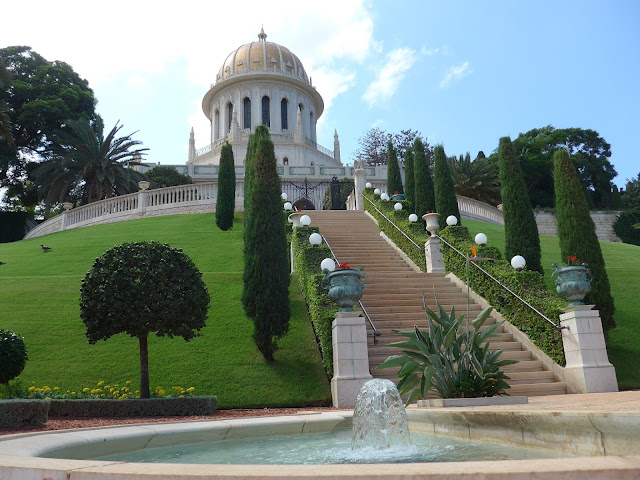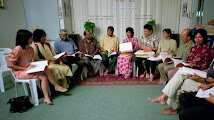Following are some thoughts and selected writings pertaining to the spiritual qualities of 1. happiness/comfort, and 2. humility:
1. Happiness/comfort
'Abdu'l-Baha shows us the attitude we should strive for with respect to these two qualities:
"...do ye not seek one moment of rest by day or by night. Nay, rather strive after composure of heart in the heaven of Unity. Do ye not for one moment obey the instinct of the worldly consciousness for ease. Seek ye divine happiness through the hardships and sorrows of this physical world, and behold spiritual well-being in the struggles of this fleeting existence. Distill sugar and honey from the bitter poison of suffering. Recognize the caress of divine favor in the arrows of misfortune. Consider the lowest degree of humiliation in the path of the Blessed Perfection as the highest station of Glory. Know descent to be identical with ascent, and consider death itself the essence of life.”
(#798 - http://bahai-library.com/compilat.../bahai.scriptures/8.html )
2. Humility
a) I find 'Abdu'l-Baha's Prayer of Visitation to be among the most poignant of the writings with regard to humility, that I know of (note the introduction as well, which is essential in reciting it - "Whoso reciteth this prayer with lowliness and fervor...")
You can read the prayer here: http://bahaiprayers.org/abdulbaha.htm
b) From the following quotation it seems like we are enjoined to feel antipathy and dissatisfaction about all that pertains to our lower self - not the body, of course (which is "the throne of the inner temple" and should "be treated with respect"), but its animalistic/natural impulses and inclinations (desire for comfort and ease, social recognition and praise, fault finding, rivalry/competition etc, which 'Abdu'l-Baha has explained are blameworthy):
"'Do all ye can to become wholly weary of self, and bind yourselves to that Countenance of Splendours; and once ye have reached such heights of servitude, ye will find, gathered within your shadow, all created things. This is boundless grace; this is the highest sovereignty; this is the life that dieth not. All else save this is at the last but manifest perdition and great loss. Praise be to God, the gate of boundless grace is opened wide, the heavenly table is set, the servants of the Merciful and His handmaids are present at the feast. Strive ye to receive your share of this eternal food, so that ye shall be loved and cherished in this world and the next."
(SWA - http://reference.bahai.org/en/t/ab/SAB/sab-37.html)
c) In a recent blogpost, http://bahaiblog.net/.../05/4-qualities-bahaullah-loved-see/, I read about the four qualities Baha'u'llah liked to see in people. It continues:
"In contrast to these positive qualities, Abu’l-Qasim Faizi (the most distinguished Baha'i scholar who 'Abdu'l-Baha even encouraged the believers to emulate - A.B.) tells us Baha’u’llah also felt sad about the following five negative qualities:
"Those who see themselves as knowledgeable and feel proud of it.
"Those who render a valuable service or initiate a useful innovation, but show pride about their accomplishment.
"Those who feel proud about their lineage.
"Those who are proud of their physical beauty and attraction.
"Those who regard themselves as wealthy and are proud of it.
"We can see here that the key word in all the five sentences is pride."
d) Being humble certainly doesn't mean to be glum; 'Abdu'l-Baha exhorts us to possess a spirit intrinsically enthusiastic and positive:
"[T]hrough meeting the Beauty of Abhá, they should be joyful, active, aglow with zeal and wonderful. This is the station of the sincere. This is the quality of those who are firm. This is the illumination of the faces of those who are near."
(http://reference.bahai.org/en/t/c/BWF/bwf-58.html )
e) Baha'u'llah is generally firm and explicit in his requirement to disregard our own ideas and wants -
"We have forbidden men to walk after the imaginations of their hearts..." (Gleanings, #100)
However, if we are to rid ourselves of all desires except those which God has desired for us, we must first undertake the arduous (and perhaps neverending!) task of discovering the difference between what we actually need (what we cannot live without without seriously handicapping ourselves) and what we want (what we've been habituated to like, eat, buy, do, watch, listen to etc). I find the account of 'Abdu'l-Baha's encounter with the Persian prince Zillu's Sultán given in a talk by Hand of the Cause A.Q. Faizi, interesting in this respect (equally, the humility expressed by Faizi himself):
"There were many kind and beautiful regards expressed toward the Hands of the Cause. But dear friends, in the Cause of God we are all the same. This is what we propagate throughout the world: that this is a religion which has no rank or positions. We have all the same responsibility. We should all put our shoulders together and carry the burden of our beloved Faith. The more discharged we are, the better we can discharge our duties....
"I want to tell you something that `Abdu'l-Bahá said in order to make clear what I mean about being empty of self and from all selfish desires, passion and ego. You know `Abdu'l-Bahá traveled in Europe after He had been released from prison, and he traveled in America too, to propagate the Faith of His Father. One of the greatest and cruellest enemies, one of the princes of Persia, was in Europe at the same time as `Abdu'l-Bahá. One day he went to `Abdu'l-Bahá and said, "I have come to ask you one question. Look at me, my hat is covered with diamonds, my garments have all sorts of jewels, and yet when I walk in the streets, nobody looks at me or pays any attention to me. And yet, when you walk in the streets and you have the simplest garment in the world, everyone makes way for you. They come to you. There are always hundreds of people at your door. I want to know why."
"`Abdu'l-Bahá knew him and knew that because of him many of the Bahá'ís had been put to death. Therefore he told him, "Your Highness, will you sit down a little and I will tell you a story." The prince sat down. The name of that prince was Zillu's Sultán, the son of Násiri'd-Dín Sháh. The Master said: "Once a wise man passed the square of a certain town and found one of the richest people of that town gloomy and sad, brooding over his sorrows in the corner of the square. He went to him and asked, `What is the matter with you?' He answered, `I have enough money to be the greatest merchant in this town, but I am not satisfied. I want to be greater than that.' The wise man said, `For instance, what would you like to be?' The merchant replied, `I want to be the governor of this town.' The wise man said, `If I make you the governor of this province, not the town, but the whole province, will you be satisfied? Please search your heart and give me the true answer.' The man pondered and then said: `Honestly, I will not be satisfied. I want to be a minister.' `I will make you a Minister, but give me another honest answer, will you be satisfied?' After that, he wanted to be King of the country, and the wise man said, `I will make you the king, will you then be happy and satisfied? Do you want anything beyond that?' The man replied, `After that there is nothing.' `Abdu'l-Bahá then said to the prince, "Your Highness, I am that nothing."
"This is what I mean. Let us all go out, the last day of the conference, just nothing, and then find the miracles that will be done by everyone of us, with the help of Bahá'u'lláh. Alláh-u-Abhá."
http://bahai-library.com/faizi_australia_1969
Found this interesting? Feel free to subscribe here!















